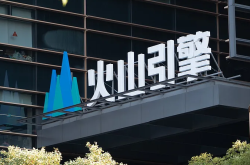Is the severely underestimated Bairong Yunchuang still able to wait for Zhang Shaofeng's breakthrough?
![]() 06/25 2024
06/25 2024
![]() 571
571
Why is Bairong Yunchuang's market value not increasing, and its internal control management has also failed? What's going on?
According to information from "China Technology Investment," recently, Bairong Yunchuang Technology Co., Ltd. issued an internal employee letter stating that Nie Shuo, the head of the marketing department, abused his position during his employment and sought personal gains through various means such as illegally appropriating company assets. Currently, the prosecutor's office has officially arrested him.
Correspondingly, the company's founder and CEO Zhang Shaofeng was deemed to have primary management responsibility and was fined RMB 100,000...
To be honest, upon reading this, it is truly difficult not to feel the numerous issues involved. Not only the unethical behavior of the internal "big rat" and Zhang Shaofeng's "misfortune," but also the fact that a financial technology company known for its rigor and sensitivity ultimately failed in internal control management, making it difficult not to raise greater safety concerns...
However, interestingly, I originally thought that such a major negative event might affect its stock price trend.
But unexpectedly, Bairong Yunchuang in the capital market has already somewhat taken on a "more fleas, less itching" attitude. Even though it has repeatedly repurchased its own shares in the past to boost market confidence, the stock price still can't hold up, and the overall trend is quite sluggish.
But even more contradictory is that Bairong Yunchuang's fundamentals are quite impressive.
For a moment, many investors are curious about Bairong Yunchuang...
Unable to exit the financial comfort zone, unable to increase valuation?
Since Hong Kong stocks do not mandate the disclosure of quarterly reports, the most recent complete "scorecard" we can see for Bairong Yunchuang is its 2023 annual report.
In the past year, Bairong Yunchuang achieved revenue of 2.681 billion yuan, a year-on-year increase of 31%; net profit of 335 million yuan, a year-on-year increase of 46%; and adjusted net profit reached 375 million yuan, again刷新 its best financial performance since going public.
Among them, Bairong Yunchuang's pillar business, Maas (Model as a Service), achieved revenue of 891 million yuan, a year-on-year increase of 17%. The retention rate of core customers increased to 99%. The second growth curve, Baas (Business as a Service) business, achieved revenue of 1.79 billion yuan, a year-on-year increase of 38%.
With this performance, coupled with the current market trend of generative AI and large models, it seems unlikely that Bairong Yunchuang should only trade at less than 2 times its price-to-sales ratio and a market capitalization of only 4.449 billion yuan (as of the close of June 24). Not to mention that at the end of last year, its cash and cash equivalents and term deposits totaled over 3 billion yuan.
So where is the problem?
Currently, apart from the external environment, the most likely explanation is that, in terms of business model and positioning, capital may still view Bairong Yunchuang as just a software service provider in the financial industry. And this software service model, in the long run, still has various growth challenges and hidden dangers.
In the first half of 2023, Bairong Yunchuang underwent a business line reorganization, combining its intelligent analysis and operations, precision marketing, and insurance distribution "three business lines" into Maas and Baas businesses.
Behind the reorganization, the biggest change is that Bairong Yunchuang has appropriately weakened its past financial attributes, seemingly finally starting to expand from the limited financial industry scenario to a larger non-financial circle.
For example, in 2022, the core customer definition of Bairong Yunchuang was still "licensed financial institutions that contribute revenue of RMB 300000 or more each year," but it had already become "paying customers who contribute revenue of RMB 300000 or more to the company each year."
To be honest, this is a very good signal. Although the financial service market is large and the willingness to pay is high enough, the problem is that many banking financial institutions are also doing this business in order to "reduce costs and increase efficiency". In addition to the boundless expansion of other Internet financial giants, even though Bairong Yunchuang has accumulated a lot of financial AI technology and experience in advance, its future growth imagination is still very limited.
Unfortunately, despite the directional adjustments made by Bairong Yunchuang, the essence of its financial industry software service provider seems to have not changed in terms of business focus and revenue composition in the short term.
The most direct manifestation is that Bairong Yunchuang's largest and fastest-growing revenue sector in 2023 is still focused on Baas business in areas such as finance, insurance, and wealth management.
The logic of Baas business is to use generative AI technology and voice robots to help banks or other financial institutions directly reach C-end customers and complete the final transaction. So essentially, it's a bit like "lending assistance", where Bairong Yunchuang personally sells products for financial companies and then charges according to the final transaction size facilitated.
Here, some bearish investors expect that the future domestic credit growth rate may slow down due to the impact of the external economic environment, which in turn will affect the business scale of Bairong Yunchuang. However, according to my observation, since the decline of loan interest rates, various aspects have been continuously boosting and stimulating credit demand. For example, although there is indeed expansion pressure on the banking and financial sectors, it is far from the point of growth stagnation.
For example, Ningbo Bank's customer loans and loan principal reached 1.253 trillion yuan at the end of 2023, a year-on-year increase of 19.76%. In the first quarter of this year, it reached 1.362 trillion yuan, an increase of 8.73% compared to the end of the previous year, and the overall loan performance was quite impressive.
Therefore, the current gameplay of Bairong Yunchuang in promoting high growth in the loan assistance sector by increasing sales expenses can theoretically continue for a period of time. Unfortunately, the biggest and most competitive knowledge of Bairong Yunchuang is not in Baas, which can be considered as a valuation deduction.
As for the core moat of Maas business, the key lies in the evaluation and solution of AI models. This was previously a market bullish on Bairong Yunchuang, but it is also a disappointment for it now.
Because compared to Baas, which sells goods for the financial industry, Maas, which sells software services to the financial industry, is currently more able to demonstrate the competitiveness of Bairong Cloud Creation AI, but it is not a high growth business.
Not only is the growth rate of revenue scale far behind Baas, but there has also been a certain slowdown in the growth of core customers.
As of the end of 2023, Maas had 213 core customers, an increase of 14% year-on-year from 187 in 2022.
At first glance, doesn't it look pretty good?
The problem is that under the same contribution income standard, the core customers of intelligent analysis and operation services have already reached 227 in 2022.
Although there may be changes in paper customer planning caused by business splitting behind this, looking at the core customer retention rate of 99%, it is no wonder that some investors are worried about the growth ceiling of Bairong Yunchuang now.
The only thing left that can break through is the NDR of core customers, which is commonly referred to as "customer unit price".
However, during the reporting period, the average revenue of Bairong Yunchuang's core customers was 3.495 million yuan, a year-on-year increase of only 3%.
Of course, the commercial essence of Maas is that Bairong Yunchuang provides various standardized AI models, which users can call in real time through API links and charge according to their usage.
Normally, as long as financial clients have business changes, the call volume only increases and does not decrease. The consensus in the market now is that the total payment volume of Bairong Cloud Creation's B-end customers will continue to increase, but the target price difference is significant. The difference lies in the prediction of the macro situation and the comparison of the degree of customer introduction in other industries.
To be honest, no one can predict where the future will go. But for Bairong Yunchuang, what can be confirmed now is that the capital market expects it to break through the financial "comfort zone" scenario and truly become an AI technology service provider, rather than just a financial industry software service provider.
Perhaps it is precisely because of this that Bairong Yunchuang's valuation has been constantly discounted as the revenue center of Maas shifts to Baas
Will risk control management become a "weakness" for Bairong Cloud Creation when stability is at the forefront?
Looking at the recent incident involving Nie Shuo, the head of the marketing department, it is essentially a problem with the risk control management of Bairong Yunchuang.
Although to some extent, this risk can only cause temporary fluctuations in the capital market and hardly shake the long-term market foundation. But the problem is that Bairong Yunchuang's risk control issues are not only internal management, but also at the level of business products, leaving an indelible scar and "black history".
The most typical example is the frequently complained "banyan tree loan" issue.
Tianyancha APP shows that Banyan Loan was established in 2017 and jointly developed and operated by Shenzhen Datafun Information Technology Co., Ltd. and Guangzhou Datarong Internet Microfinance Co., Ltd. Among them, Shenzhen Shuqu Information Technology Co., Ltd. was deregistered in May 2021. The remaining Shurong Xiaodai is a wholly-owned subsidiary of Bairong Cloud, with a subscribed capital of 200 million yuan.
Based on the comprehensive prospectus and various information, Banyan Tree Loan can be seen as a loan assistance platform under Bairong Yunchuang, a guiding platform for precise marketing for banks and other financial institutions.
But unfortunately, this is the role of an intermediary, and there are many complaints on the market side.
For example, regarding the dispute over loan interest rates, a user complained on Black Cat, stating, "It has a loan of 32000 yuan from Qian Xiaole under the Banyan Tree Loan Platform, with a monthly repayment of 3214 yuan and a repayment period of 12 months. The annual loan interest rate is as high as 35.98%, and they are requesting a refund."
For example, regarding the issue of insurance premiums, some users have reported that they applied for a loan on the Rongshu Loan Platform in 2023, with a principal of 4000 yuan. The loan contract shows a repayment amount of 4186.54 yuan for 12 installments. (including principal repayment, interest, and other expenses). But later, it was found that the amount returned did not match the contract amount, and 4822.2 yuan was to be repaid in the 12th installment. This also includes a high service fee of 635.64. 15% of the loan amount.
In addition, violent collection and disclosure of personal information are also considered the hardest hit areas for complaints from the Banyan Tree Loan Platform.
Of course, as most of the above complaints are from third-party platforms and their authenticity is questionable, we will not comment for the time being.
However, to be honest, facing over 5000 complaints and the proactive response of Banyan Tree Loans labeled as "business" on relevant complaint platforms, it may also indirectly expose certain product risk control issues of Bairong Yunchuang.
So what is the impact?
Firstly, we need to know that what Bairong Yunchuang has been doing is actually the pre loan management process for financial institutions to attract and screen users.
Now, with so many complaints from front-end drainage platforms, it reflects on the legitimate banks or financial institutions in the back-end, which naturally means a surge in non-performing loans and complaints.
But the problem is that due to external macro trends and interest rate spread pressures, major financial institutions including banks are now reducing non-performing loan ratios, preventing and resolving risks, and taking a prudent and conservative approach. That's why there have been incidents of banks such as Everbright and Weizhong personally recruiting talent for debt collection.
Fundamentally, this is because banks and other financial institutions in the past, in order to expand, had overly extensive or even radical pre loan management, which has led to the current situation of banks and financial institutions making up for the shortcomings in post loan collection.
So in the current context where stability is a top priority in the banking and financial industry, if Bairong Yunchuang and Rongshu loan platforms continue to allow high service fees and other pre loan management chaos, will it attract dissatisfaction from core customers?
After all, the market's requirements for Bairong Cloud Creators with AI big model technology are constantly increasing. They need to attract more precise marketing, as well as ensure safer pre loan management for users and lower repayment risks after loans
Write at the end:
Although there may be many investment concerns in the long run, it cannot be denied that Bairong Yunchuang's performance is still growing at a good pace.
As for the transformation towards the financial scene, it is indeed slow, but at least it has also started. In addition, continuous repurchases indicate that major shareholders value shareholder returns, and Bairong Yunchuang has the confidence and time to adjust. Therefore, we may as well give Bairong Yunchuang and Zhang Shaofeng more time to release their value
Disclaimer: This article is based on the company's statutory disclosure content and publicly available information, and comments are made. However, the author does not guarantee the completeness or timeliness of such information. Additionally, the stock market carries risks and caution is required when entering the market. The article does not constitute investment advice, and investment decisions must be carefully considered.






